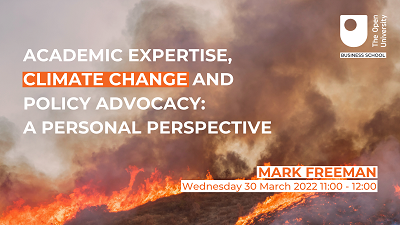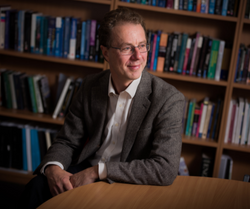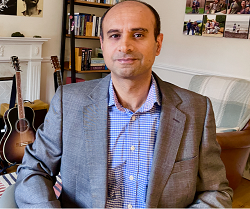Academic expertise, climate change and policy advocacy: A personal perspective
- Dates
- Wednesday, March 30, 2022 - 11:00 to 12:15
- Location
- Online
- ContactOUBS Events Team

Across the world, governments proactively seek advice from academic experts to generate ideas and analysis for policy purposes. But on what terms should this engagement between academics and the public sector be contracted? Do academic experts have “…special status as providers of neutral and apolitical evidence…”, or are they instead “…one type of actor among others providing input in the political system…” (Christensen, 2021)? At the heart of this matter is whether it is desirable (or inevitable) that academics who engage in policy work frame their own expert testimony to be deliberately (or unconsciously) consistent with their own subjective policy preferences.
By drawing on his experiences from working with the public sector around climate change economics, Professor Mark Freeman explains the inherent difficulties he sees in being an academic policy advocate in such a politically charged field. Being an expert requires ultra-high levels of specialism that form only a small part of the macro-challenges that policy makers need to balance. In addition, the subjective value judgements that underpin these policies vary widely across the voting public. Prof Freeman will argue, that in this field, academics should aim for policy neutrality when giving expert advice, even if this is often difficult to achieve in practice.
Join him as he discusses how academics who advise on policy can avoid putting personal beliefs before expert recommendations.

Mark Freeman
Mark Freeman is Dean at the University of York Management School and a Professor of Finance. He is interested in intergenerational finance, particularly cost-benefit analysis for projects that span many decades. His work has a range of applications primarily in the economic analysis of climate change mitigation, investment in infrastructure and other long-lived projects, as well as the estimation of defined benefit pension scheme deficits. He has provided guidance to HM Treasury, the UK Home Office and Department for Transport, the Ministry of Finance (Netherlands), the UK Office for National Statistics, the Financial Conduct Authority, the Institute and Faculty of Actuaries, and the OECD. Currently, he is engaging with the public consultation process on the Social Cost of Carbon in the United States. Mark started his career as a stockbroker in the City of London. He has previously worked at the Universities of Loughborough, Bradford, Exeter and Warwick and held visiting positions in the United States and Australia.

Ali Ataullah
Ali Ataullah is Professor of Finance at the Open University Business School (UK). His research interests include corporate governance, public procurement and mechanism design, insider trading, bank efficiency and productivity. His current research focuses on the role of institutional investors in determining firms’ investment and financing policies, which, in turn, affect climate risk. He is also exploring the role that communities’ social capital play in determining firms’ investment and financing decisions. He has published in leading academic journals, including Abacus, Accounting and Business Research, British Journal of Management, European Financial Management, European Journal of Finance, Financial Review and Human Resources Management (US). He is also the director of the Centre for Public Understanding of Finance, Institutions and Networks.
